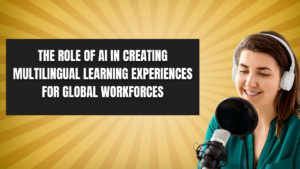In today’s fast-paced digital world, Learning Management Systems (LMS) have become a staple for education, corporate training, and skills development. These systems help organizations manage, track, and deliver training programs effectively.
However, as the demand for more personalized, efficient, and scalable learning experiences grows, integrating Artificial Intelligence (AI) with your LMS can take learning and development (L&D) to the next level. Let’s explore how AI can enhance your LMS and transform the learning experience for both learners and administrators.
What is AI in Learning Management Systems?
Artificial Intelligence is the simulation of human intelligence in machines designed to think, learn, and problem-solve. In the context of an LMS, AI can be implemented in various ways to improve user experience, enhance content delivery, and automate administrative tasks. From personalized learning paths to data-driven insights, AI brings tremendous value to educators and learners.
Personalized Learning Paths
One key benefit of incorporating AI into an LMS is the ability to provide personalized learning experiences. AI algorithms can analyze data about a learner’s past behavior, performance, and preferences to create custom learning paths tailored to their individual needs.
For example, if a learner struggles with a particular topic, AI can recommend additional resources or modify the course structure to ensure that the learner grasps the concept before moving on. This personalized approach helps improve engagement, retention, and overall learning outcomes.
Intelligent Content Delivery
AI can revolutionize the way content is delivered in an LMS. With machine learning algorithms, an LMS can analyze how different learners interact with content and make recommendations for improvements or adjustments. For example, the system might automatically adjust the difficulty level, introduce multimedia elements, or provide additional context based on the learner’s engagement.
Additionally, AI-powered chatbots can assist learners by answering questions in real time, guiding them through content, and providing clarification when needed. This 24/7 support can significantly enhance the learning experience, especially in asynchronous environments.
Automated Assessments and Feedback
Manual grading assignments, quizzes, and exams can be time-consuming for educators. With AI, however, assessments can be automated, providing immediate feedback to learners. This not only saves time for instructors but also enables learners to receive feedback in real-time, which is crucial for improvement.
AI can also track learners’ progress over time, automatically adjusting assessments to their skill level. For example, if a learner consistently excels in quizzes, the system may provide more advanced questions or suggest advanced courses. Conversely, if a learner struggles, the system may simplify questions or recommend additional study resources.
Predictive Analytics for Improved Decision-Making
AI can leverage data analytics to predict learner performance, engagement levels, and potential roadblocks. By analyzing learner behavior patterns, AI can help administrators identify students who may be at risk of falling behind, allowing them to intervene early.
This predictive capability is invaluable for businesses and educational institutions. It allows for data-driven decisions, such as adjusting course difficulty, implementing personalized support plans, or identifying training gaps. This proactive approach ensures that learning goals are met and students stay on track.
Enhanced Learner Engagement with Gamification
AI can enhance learner engagement by integrating gamification strategies into your LMS. Gamification—such as incorporating points, badges, and leaderboards—can motivate learners to complete courses, participate in discussions, and engage with the content more interactively.
AI can personalize these gamified elements to make them more appealing. For example, an AI system can monitor a learner’s progress and suggest challenges that align with their interests or goals. By making learning more enjoyable and competitive, gamification helps increase learner motivation and overall course completion rates.
Intelligent Recommendations and Course Curation
AI can make learning more efficient by recommending relevant courses or resources based on a learner’s interests and previous activity. For example, if a learner has completed a course on leadership skills, the LMS might suggest additional courses on project management, communication, or decision-making.
This intelligent recommendation system ensures that learners are continually challenged and encouraged to expand their skill sets while streamlining their learning journey. This personalized content curation saves learners time and keeps them engaged and focused on their professional development.
Efficient Administrative Tasks
Administrators often face the challenge of managing many learners, tracking progress, and ensuring that courses are updated and maintained. AI can automate many administrative tasks, such as enrollment, scheduling, and course updates, saving valuable time and reducing the administrative burden.
Additionally, AI can help with reporting and analytics. Instead of manually gathering data from different sources, AI can provide real-time insights on learner performance, course effectiveness, and overall trends, allowing administrators to make data-driven decisions quickly.
Seamless Integration with Other Technologies
AI-powered LMS platforms can be integrated with other technologies such as Virtual Reality (VR), Augmented Reality (AR), and Internet of Things (IoT) devices. This integration creates an immersive, interactive learning environment where learners can innovatively engage with content.
For instance, AI can pair with VR to simulate real-world scenarios, allowing learners to practice skills in a safe, controlled environment. This combination of AI and VR can be especially useful in corporate training for simulations and skill assessments.
Continuous Improvement with AI-Driven Insights
AI’s ability to collect and analyze vast amounts of data means that LMS platforms can continuously improve their content and functionality. With feedback from learners and performance data, AI can identify areas for improvement, fine-tune course content, and update materials based on the latest trends and learning practices.
Moreover, AI can spot content gaps or trends across a broader learner demographic, helping educators create more relevant and impactful courses.
Scalability and Flexibility
As organizations grow and learner populations increase, an AI-powered LMS can scale efficiently. AI can handle larger volumes of learners without compromising on the quality of the learning experience, making it an ideal solution for institutions and companies seeking to expand their training programs.
AI’s flexibility allows it to be customized for different types of learners, industries, and learning environments, ensuring that it remains effective regardless of the organization’s size or scope.
Conclusion: The Future of Learning Management Systems with AI
Integrating AI into Learning Management Systems is a game-changer for educational institutions, businesses, and learners. By offering personalized learning paths, intelligent content delivery, predictive analytics, and automated administrative tasks, AI transforms the learning experience into something more efficient, engaging, and impactful.
For businesses looking to enhance employee training or educational institutions aiming to provide a more tailored learning experience, adopting AI within your LMS is not just an option—it’s the future of education and training. Embrace AI today, and stay ahead of the curve as it revolutionizes how we learn and grow.










